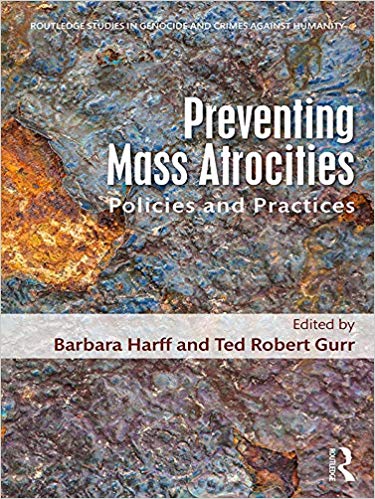Preventing Mass Atrocities: Policies and Practices (Routledge Studies in Genocide and Crimes against Humanity), edited by Barbara Harff and Ted Robert Gurr
Contents
1. Introduction | Barbara Harff
2. Genocide and mass atrocities: Can they be prevented? | Yehuda Bauer
PART I
Risk Assessment, Early Warning, and Early Response
3. Countries as risk of genocide and politicide after 2016—and why | Barbara Harff
4. Atrocity crimes as a disease: A statistical approach to early detection | Birger Heldt
5. Preventing genocides and mass atrocities: Evidence from conflict analysis | Ted Robert Gurr
PART II
Mobilizing International, Regional, and Local Responses
6. Ending the silence on war crimes: A journalist’s perspective | Roy Gutman
7. Preventing mass atrocities at the local level: Using village communities for conflict prevention in Mauritania | Ekhehard Strauss
8. In the absence of will: Could genocide in Darfur have been halted or mitigated? | Eric Reeves
9. Atrocity Prevention from Obama to Trump | James P. Finkel
10. Prevention through political agreements: The community of Sant’Egidio and the Central African Republic | Andrea Bartoli and Mauro Garofolo
11. An African regional perspective on prevention: Experiences in the Great Lakes region | Ambassador Liberata Mulamula and Ashad Sentong
12. Roots of ambivalence: The United Nations, genocide, and mass atrocity prevention | Edward C. Luck
13.Who is in charge? Emerging national and regional strategies for prevention | Andrea Bartoli and Tetsushi Ogata
14.Guidelines for prevention of genocides and other mass atrocities: An overview | Ted Robert Gurr
**********************
Chapter 8. “In the Absence of Will: Could Genocide in Darfur have been Halted or Mitigated?”
Eric Reeves
Abstract: Despite countless opportunities to halt genocide in Darfur, ongoing since 2003, the international community has accommodated the wide-ranging atrocities of the National Islamic Front/National Congress Party regime. With varying motives, the UN, the African Union, the European Union and the United States have all acquiesced in the face of the regime’s canny obduracy. Europe, which never considered imposing the severe economic sanctions of the sort imposed by the U.S., has commercial and economic interests in the country, and increasingly wants Khartoum as a partner in stanching the flow of African migrants to Europe. The U.S. since 9/11 has been obsessed with obtaining from Khartoum counter-terrorism intelligence. UN leadership, particularly under Secretary-General Ban Ki-moon, has been feckless and misguided. For reasons of narrow self-interest, the African Union leadership has been content to praise the collapsing UN/African Union (“Hybrid”) Mission in Darfur, a Mission that has failed catastrophically in its primary mission of civilian protection. All this occurs against a backdrop of rapidly increasing repression in Sudan, the implosion of a badly managed economy, and the outbreak of new genocidal counter-insurgencies in South Kordofan and Blue Nile. Darfur is the scene of vast militia violence, disintegrating international humanitarian operations, and the continuing displacement of some 3 million non-Arab Darfuris. Their future is grim beyond description.